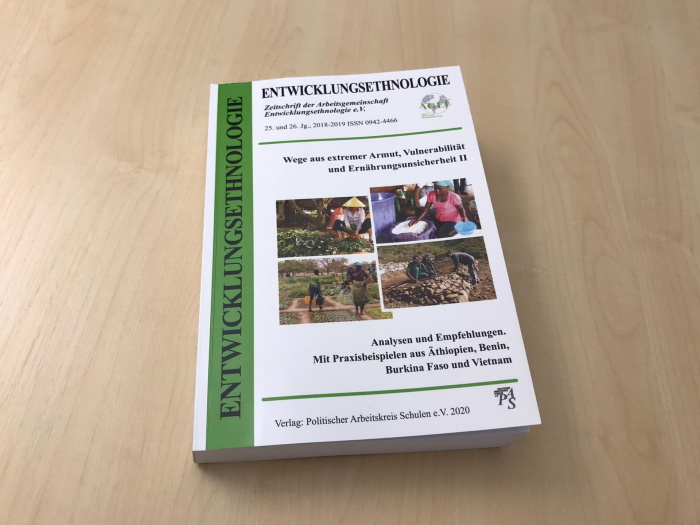
AFC contributed to the Zeitschrift der Arbeitsgemeinschaft Entwicklungsethnologie (in English, Journal of the Working Group Developmental Anthropology) “Ways out of extreme poverty, vulnerability and food security II”, as part of our collaboration with German Universities and Research Institutes. AFC’s contribution focusses on Practical experiences of the value chain approach as a tool for rural development.
Through this paper, we present a four-step approach for value chain development: (i) value chain analysis, (ii) specific activities to address key bottlenecks, (iii) specific activities to increase value addition, and (iv) institutional strengthening of actors across the value chain. We illustrate this approach with case studies drawing from our experience in Mali, India, Côte d’Ivoire, Nigeria and Ghana.
In the first step, we conclude that, in our experience, value chain development is directed towards key levers for solving bottlenecks or creating new value-addition opportunities. This often involves engaging with lead farmers, innovators and investors throughout the value chain capable of driving change.
At a later stage, poorer groups can be included and benefit from the development of agricultural value chains. Job creation at the processing stage is an obvious option for including poorer segments of society. However, many of these jobs are more likely to be in peri-urban environments closer to end markets, and therefore not an option for the rural poor.
At the farm level, there are opportunities to include poorer smallholders in higher-value value chains by (i) helping overcome barriers to entry (training, access to finance, certification standards, lowering input costs etc.), and (ii) developing new business models (linking with off-takers and developing partnerships with processors, etc.). However, there are limits to how much the poorest, for example landless farmers, can engage in and benefit from such models. For such groups, other targeted social programs will be required.
Furthermore, we have to take into consideration the role of rural-urban migration. Many poor farmers will not stay in rural areas, in particular the younger generation will move to cities, where job opportunities will need to grow.
Private investments aiming to make a profit in the long run will play a key role in developing agricultural value chains in the future. Investments in local processing and packaging units lead to direct job creation, but also an increased local demand for produce from smallholders, creating an opportunity for them to engage in higher-value markets.
This is where we, as an international consultancy in cooperation with local extension services, can play a clear role bridging the gap between rural development objectives and private sector investments in order to develop sustainable value chains benefitting all actors from the smallholder to the private investor and finally increase incomes for the rural population.
Read the full article here:
